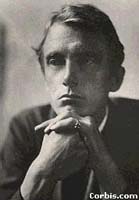The Owl Comments
DOWNHILL I came, hungry, and yet not starved,
Cold, yet had heat within me that was proof
Against the north wind; tired, yet so that rest
Had seemed the sweetest thing under a roof.
...
Read full text
One further point that illustrates both Thomas's sensitivity as a poet and his remarkable honesty.'Salted' is an apt choice of word, and Thomas is right to repeat it. While his sympathy for 'soldiers and poor' is genuine, 'rejoice' suggests his own sense of contentment which triggers feelings of guilt or bad conscience. 'Salted' thus suggests both pleasure and pain; salt as adding flavour and salt as harshness, as in rubbing salt into a wound. Quite brilliant.
I admire this poem as much as Adelstrop, which is saying a great deal. The construction with its flow and stress on key words (e.g. hungry, cold, tired) is simple yet effective. Synonyms for these words are picked up and matched in the second stanza, and a new element, the owl's cry, is introduced. In the third verse, Thomas's wide reading is evident as he differs from Shakespeare regarding the significance of the owl's cry. In the last stanza, Thomas tells of the sobering effect of this voice, and an awareness of those less fortunate than himself.

It is a lovely poem! !